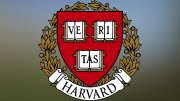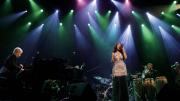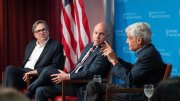Harvard and its leaders should not issue official statements about public matters that do not directly affect the institution’s core function of research, teaching, and learning. That was the conclusion reached by a faculty working group tasked with answering a question that has deviled administrators since the start of the Hamas terrorism and Israel-Gaza war last fall: when and whether Harvard should take public positions on political issues.
The Institutional Voice Working Group, convened in April by interim president Alan M. Garber and interim provost John F. Manning, released its final report on Tuesday, offering guidance and a statement of principles. In an email addressed to the Harvard community, Garber, Manning, executive vice president Meredith Weenick, and the University’s deans announced that they had accepted the working group’s recommendations, and that the Harvard Corporation had endorsed the recommendations as well.
Chaired by Frankfurter professor of law Noah Feldman and Wolcott professor of philosophy Alison Simmons, the working group included faculty members from across the University and gathered feedback from more than 1,000 faculty members, students, staff, and alumni through focus groups, an online poll, and a dedicated email address. “The process of translating these principles into concrete practice will, of course, require time and experience,” read the email from Garber, Manning, Weenick, and the deans, “and we look forward to the work ahead.”
In its report, the working group offers three main rationales for the recommendation against making statements on public issues that don’t directly affect the University’s work. First, “when the University speaks officially on matters outside its institutional area of expertise”—that is, “the running of a university”—those statements compromise “the integrity and credibility of the institution.” Second, the report reasons, if University leaders become accustomed to making public statements, “they will inevitably come under intense pressure to do so from multiple, competing sides on nearly every imaginable issue of the day. This is the reality of contemporary public life in an era of social media and political polarization.” Third, the University risks being seen to take a side in political issues. “Given the diversity of viewpoints within the University, choosing a side, or appearing to do so can undermine the inclusivity of the University community. It may make it more difficult for some members of the community to express their views when they differ from the University’s official position.” Instead, the report suggests amplifying “intellectual engagement” in pressing issues through classes, conferences, scholarship, and teaching.
The report also argues that, given diversity of viewpoints and experiences within Harvard’s community, “The most compassionate course of action” during national or global cataclysms like wars or natural disasters or “different forms of persecution,” is “not to issue official statements of empathy.” Instead, the working group recommended expanding the efforts of Harvard’s “pastoral arms” in schools and residential houses, dedicating resources to training staff who deal directly with those who are affected by events. “These concrete actions,” the report states, “should prove, in the end, more effective and meaningful than public statements.”
The report stresses that faculty members speak for themselves and must be free to do so; it also allows for Harvard centers, clinics, and entities in specific fields such as medicine, public health, government, education, and law to issue reports and white papers that “translate knowledge into action.” Meanwhile, those who are understood to speak for the University include administration officials such as the president, provost, and all deans, as well as heads of departments, centers, and programs. (It is not clear how much it would have helped for Harvard to have a policy like this in place during the past school year, since for the most part it has been students who have spoken out on the Israel-Gaza war, and have been deemed to speak for Harvard, in the view of those outside the institution.)
Harvard began to consider adopting a position of institutional neutrality (similar to the one outlined in the University of Chicago’s 1967 Kalven Report) after wavering statements on Hamas’s October 7 attack on Israel sparked chaos on campus. Months of protests and convulsions have followed, as the war in Gaza intensified. But importantly, the working group’s report clarifies that while Harvard should not speak out on matters beyond its “core function,” the University “can never be institutionally neutral,” because “We are committed to the value of seeking truth through open inquiry and debate.”
Later, the report emphasizes: “The policy of speaking officially only on matters directly related to the University’s core function, not beyond, serves those values. It should enable the University to endure and flourish, providing its unique public good even—and especially—in times of intense public controversy.”









